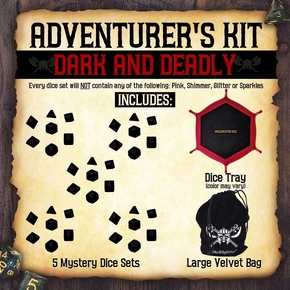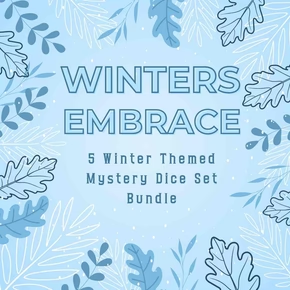
DnD5e Feats
Everything You Need to Know
Variety is the spice of life and with this guide, your characters can be tailor-made to meet your playstyle . But there's a lot of options, and the cost to take them is high. Which one should you take? Should you take them at all? When should you take them? Take a second and we'll walk you through all the core feats and explain everything you need to know for . Before we get started, make sure that you check with your that a specific is allowed at their table!
Table of Contents:

D&D 5e Feats
Whenever your 5e character would gain an from leveling up, you can choose to instead get a . Feats are little abilities and rules that any character can take (though some will have a few prerequisites). 5e keeps their feats pretty simple, and you don't really need to worry much about building around them. Most feats are fairly well contained and just do what they're intended to do without too much work.
Feats allow you to add a unique splash or combat strategy that a vanilla character wouldn't otherwise have. They don't come cheap though, giving up an is hard and you should always weigh that tradeoff very carefully before taking a .
You'll find though that many of the lower powered feats will still add +1 to a single . If you find yourself in a situation where you don't need that other point, consider a .
Finally, feats are technically an optional rule . Your DM can choose to allow feats, or they can go without them entirely. This is done largely to keep the base game as simple as possible but keep this in mind when making a character for a particularly new DM, as they may not be allowed.
So, without further ado, let's take a look at the core feats:
Actor
If you're the rogue who loves sneaking and mischief, then you'll want the Actor . It also works quite well if you're not a rogue, but you'd like your character to play the sneak. It's a half- that still gives you a point of Charisma, so you're really trading one ability point for advantage on impersonating people and the ability to mimic the voices of guards. If you don't plan on doing those things, then leave it. If those are things you'd like to do, then this is perfect.
Alert

90% of the time, you're only going to end up using the to initiative rolls for this , which is nice... But it honestly feels lackluster for a full . Take Alert in builds that really need that to initiative, or if your DM is especially prone to sneak attacking the party, otherwise I can't recommend it.
Athlete
Athlete essentially turns you into an Olympic gymnast, the "jump up" ability to pop back from prone comes up more often than you'd think, and the climbing ability is deceptively good. With the rules as written, an "Athlete" could run straight up to the roof of a 3-story building in a single round. It's also only a "half-" and still gives you an ability point to play with. With all that said, this is great for janky builds that need a ton of mobility, but it won't do a whole lot for most builds. If you're making a character that needs to control where they are on the battlefield, grab Athlete, otherwise give it a pass.
Charger
Any character who wants to get stuck into the enemy as fast as possible should strongly consider this . It can put you right into a soft target before they know what's happening. Do remember that it takes a to use though, so barbarians especially need to choose between the charge and going into a rage on the first turn.
Crossbow Expert

This is obligatory for crossbow users and is honestly the strongest argument for making crossbow users. This turns a slow one-shot per turn into a freaking machine gun. If you have the attacks to use, you can make crossbow shots with them.
One bit of common confusion though is the one-handed stipulation for the , which basically means you can only use it for hand crossbows. This is best used for fighters or rangers who want to deal out a lot of shots with a couple of hand crossbows, or who want to wield a sword in one hand and a hand crossbow in the other.
This lets you add your to your AC as a reaction. Note that you get to use your reaction after they hit you. This can be potentially lifesaving and you can think of it as a mini shield for free every round. It's an extremely good to take for rogues and some fighters if you're swinging that rapier around and want a bit of survivability.
Dual Wielder
It's pretty obvious what type of character would benefit from this . The AC buff is extremely helpful given that a dual wielder has traded away their shield, but the big draw of this is the removal of the "light" stipulation for dual wielding. You essentially get to upgrade from d6 light weapons to chunkier d8 weapons, which is nothing to sneeze at.
Delver

This is perhaps the one the MOST dependent on your DM and what type of adventure you're in. This is straight-up overpowered in purely crawling adventures, and in many more narrative adventures it will literally never come up. Only grab this if you can expect to spend a substantial part of your campaign deep in trap-filled dungeons.
Durable
Durable is just, sadly, not very good. It doesn't really make you more survivable in a fight, since it only applies to your rests. You can technically super-heal a high toughness wizard with it but believe me when I say it's not worth it compared to just getting +2 Con in the first place. Hard Pass.
Elemental Adept
Did you make a fire-themed fire wizard that shoots fire for fire-based reasons? This is your jam right here. If the core of your build is focused on a single damage type, you really can't pass this one up, as it lets you push right past the resistances that would otherwise nerf your main gimmick.
Grappler
The brings back the "pinning" mechanic from earlier editions that was streamlined out. It seems perfect for a grappler but for the most part it's not worth the cost. You can already gain advantage on creatures you're grappling by using an to shove them prone, and restraining both yourself and the target is at best situationally useful. It's nice that they made a specifically for a grappling-focused build, but sadly the falls short.
This lets you do a TON of damage if you're confident in hitting your target, and it lets you again whenever you confirm a kill. This requires the use of heavy weapons, and if you're already lugging around a massive slab of a then consider this. I highly recommend it for barbarians as they can easily offset the penalty to hit using their reckless strikes on their . Please note that this is for a only, if you want this for ranged try the sharpshooter .
Healer
Healer lets you use a medical kit to do the equivalent of a small healing once per day, and lets you use medical knowhow to stabilize people with a . There's honestly only one reason to take this , and that's if nobody in your party rolled up anything with any healing capacity. The isn't great, but it's way better than nothing if your party composition is severely lacking heals.
Heavily Armored
Heavily armored is pretty basic stuff. You get a point of Strength, proficiency, and you need proficiency to take it. You'll only ever need this if you're making a cheeky armored caster build and you've already managed to grab the medium proficiency.
Master
This often gets mixed up with "Heavily Armored" but it is a completely different beast. You gain a point of Strength and you start tanking so hard that you get to ignore the first 3 points of damage from any non-magical bludgeoning, piercing, or slashing . This is the ideal tank , and it's a doozy. If your whole plan is to tank the hits, you should be taking this.
Inspiring Leader
With this , you can give inspiring speeches to your party to give everybody temporary hit points before charging into the fight. The speeches take 10 minutes, which means you'll only get to give speeches for fights you actually plan on. The temporary hit points are equal to your Charisma modifier + your level, so they can be quite significant. A level 4 character giving everybody 8 hit points before a tough fight can be the difference between a win or a TPK.
Keen Mind
With this you get a point of Intelligence and you basically gain a photographic memory. You always know which way is north, what time it is, and you can perfectly remember stuff from the last month. This is VERY reliant on roleplay situations but depending on the campaign it can be extremely useful. That perfect recall button can easily be abused to obtain plot-relevant info and work yourself out of tricky situations. Grab this for "mystery" style adventures where information is key.
Lightly Armored
This is an extremely simple that gives you either a point of Strength or , and light armor proficiency. It's really only useful for wizards who want some protection, though there are easier ways to gain light armor proficiency. Consider instead partaking in some multiclassing, or just being a dwarf who get it for free!
Linguist
With Linguist you gain a point of Intelligence, you learn 3 languages of your choice and you get to create your own cyphers to make secret messages. The message thing is cute, but generally this is only worth it if a language barrier has been a major problem in your adventures so far. Even in that scenario a spellcaster with "comprehend languages" is a way cheaper solution. Grab this only if that language barrier problem is serious and you've got no other way through it.
Lucky
Lucky is the only that I've seen banned. You get 3 d20 rerolls per day, and that includes rolls made against you. Lucky is busted, it can wave away a , and snickers at fumbles. Lucky is the default best , and it's always the best option unless it's banned in your game or your specific build demands a different one to function correctly.
Mage Slayer
Mage slayer has a toolbox of tricks that painfully counter the efforts of nearby spellcasters, emphasis on nearby . These lovely tricks only function while you're within 5 feet of the offending mage, a place they already don't want to be. I can't recommend mage slayer as a for most builds, as they usually only push an advantage you've already gained. If you're in the face of a squishy wizard, you're already winning, and this doesn't do anything to help you deal with the wizard flying above you or hurling fireballs from across the room. We're not sure why this doesn't actually get more use, as an enemy caster can be one of the biggest threats in dungeons and .
Magic Initiate
Magic Initiate is pretty straightforward, you gain a 1st level (and the accompanying ) and a couple cantrips from a casting class that you pick. This is a way to essentially get a touch of magic without multiclassing. Generally, not that great unless there's a specific you need for a janky build.
is essentially "Magic Initiate" coming from the other direction. You get a couple combat maneuvers from the "" archetype of fighter and a superiority die. As with "Magic Initiate" it's not that great unless you're running a janky caster build with a close combat bent.
Master
Master lets you wear without the penalty to stealth, and lets you add 3 to your AC from your rather than only 2. Theoretically, this works for druids and rangers who have a high and want a better AC. It's not great though, as there are better ways of doing it. It's a stretch to take it in the first place and you'll usually have better options.
Mobile
You get 10 extra feet of movement speed, you ignore difficult terrain when you dash, and you get to make hit-and-run style attacks without fear of reprisal. Characters with this are VERY hard to pin down and this is perfect for characters that want to zip around the battlefield or be a general nuisance.
Moderately Armored
Moderately Armored seems like the other "armored" feats at first. You gain +1 Strength or , and proficiency, BUT you also gain proficiency with shields. That addition of shield proficiency is a big deal as shield proficiency is strangely hard to come by in 5e. Squishy casters should strongly consider this if they've already managed to grab light armor proficiency, wizards in particular are helped immensely by the +2 AC granted by a handy shield.
Mounted Combatant
Mounted Combatant is excellent, but not consistent. Mounted combatant gives you some nice protections for your mount, but mainly it grants you advantage on melee attacks against anything smaller than your mount. So if you were say riding a horse, a large sized , you'd gain advantage on attacks on everything medium, small, or smaller. If you can expect a lot of mounted combat, this is breathtakingly good. But in a crawl where you can't fit a horse, it's completely useless.
Observant
Observant grants you +1 to either Intelligence or Wisdom, lets you read lips, and bumps up your passive Perception and Investigation skills. It's the passive bumps that are the strongest aspect of the . Detecting traps, ambushes, and the occasional plot-relevant clue, are all dependent on your passives and +5 is a BIG upgrade. Grab Observant if you can spare an ability point and you're tired of missing clues or getting surprised.
Polearm Master
Polearm Master gives you a with glaives, halberds, quarterstaffs, and spears. You also get to make attacks of opportunity with those weapons when an enemy enters your reach, rather than leaves it. There are some really cheeky builds combining polearm master with the "Sentinel" that can stop people in their tracks. Still good on its own though, as the extra is nice and getting a free swing in when the enemy comes at you is extremely useful.
Resilient
With the You grab +1 to any , and proficiency in saving throws for any ability of your choice, nice and simple. It doesn't look like much, but it's very flexible and it's one of the only ways to grab proficiencies outside of your class features. Pick this up if you're getting punished a lot on a specific type of . This is also useful if you don't want two points to get spent to get you that next tier of .
Ritual Caster
Rituals are great, but not every class gets them. This lets you alleviate that injustice and gives you two level 1 ritual spells for your trouble. Most likely, you won't need this . But if you keep running into magical artifacts and your party is short an arcane caster, you can pick this up and pick identify as one of your rituals.
Savage Attacker
Savage Attacker is extremely simple, once per turn you get to reroll your 's damage dice for an . Note that it says , so it won't do anything for spells or dice. This is a strong , but its best suited for characters with heavy weapons that swing around with d12s. Savage Attacker can help alleviate the pain of rolling 1's and 2's on a d12.
Sentinel
With the , which is the other half of the janky polearm build, but it's great in its own right. When you hit with attacks of opportunity the target's speed gets reduced to 0, creatures provoke even if they disengage from you, and you can make attacks of opportunity if enemies nearby are picking on your allies. Even without the jank, sentinel is a strong , especially for paladins or other tanks that want to keep the enemies locked in combat with them. We're still waiting to see a DM's jaw drop when someone uses this on a flying .
Sharpshooter
Sharpshooter lets you shoot at long range without penalty, shoot through cover without penalty, and lets you hit for a massive damage in exchange for an penalty. In a situation where you can actually act as a sniper, it's amazing. In most fight scenarios you'll really only get a use out of the damage buff/hit roll penalty. Best suited for fighters who can spam a ton of ranged shots for the chance at that tasty damage .
Shield Master
Shield Master gives you a shove, a +2 to saves, and essentially gives you evasion if you're using a shield. Oddly enough that shove is REALLY good since shoves can be used to knock an enemy prone and give you advantage on the rest of your attacks. This is best suited to "sword and board" fighters, and paladins. Essentially, if you're already using a and a shield, this is an excellent .
Skilled
Skilled is extremely simple, you gain 3 skill or tool proficiencies of your choice. It's... Not great. Skill proficiencies aren't really worth the ability points you're giving up, and this should only be chosen in the weirdest of fringe situations where you absolutely need a skill not provided elsewhere.
Skulker
Skulker lets you hide when you're only lightly obscured, lets you see clearly through dim light, and doesn't give you away when you miss a shot. Skulker is perfect for rogues and rangers who want to stay out of the fight but snipe shots from the dark corners of the battlefield.
Sniper
Sniper doubles the range of your spells, lets them ignore cover, and throws in a free cantrip for good measure. It's marginal at best but is obviously designed for "blaster casters" who are slinging spells all over the place. I can't say I recommend it as the situations where my 60-foot or 120-foot range spells wouldn't reach the target anyway.
Tavern Brawler
Tavern Brawler upgrades your unarmed strikes from measly 1's to d4s, lets you grapple as a , gives you proficiency in improvised weapons and throws in a +1 to Strength or Constitution. Sadly, I love the flavor of this , but I can't recommend it. The math just doesn't line up and rather than making improvised weapons and unarmed strikes good, they only make them less bad. You're better off rolling up a monk and just reflavoring them into a drunken thug.
Tough
Tough gives you 2 extra hit points per level, short and sweet. Tough gives your character a substantially large boost to their hit points and you should strongly consider this if your wizard is particularly squishy and death prone.
lets you cast spells even while holding weapons, gives you advantage on concentration checks to maintain your spells, and lets you cast spells as attacks of opportunity. is extremely good for casters who want to get stuck into a fight and those attacks of opportunity are downright nasty.
gives you proficiency with 4 weapons and +1 in either Strength or . Out of ALL the feats in the core book, I think this one is the worst. Don't take this , it's not worth it. Whatever weird build you're trying to put together there are easier ways to get proficiencies.
Racial Feats:
It's important to note that, for copyright reasons why don't include the various racial feats as featured in Wizard's of the Coast's Unearthed Aracana. Check out our Unearthed Arcana for the easy button to find these .
:
You could also potentially homebrew your own . Make sure to speak with your to make sure it'll be allowed at their table before getting too attached to it. A can be exciting for you, a new , a to an , a , or something that helps you with a in certain conditions could certainly be an option!
👉 CHECK OUT THE SWORD COAST ADVENTURER'S GUIDE HERE
--
Enjoy this Guide? You May Also Like:
Thinking about other classes? Check out our giant list of D&D 5e Tools and Tips here .
Hungry for Adventure? Your group will love these D&D Game Night Snack Recipes
Need New Dice? Check out our Dungeons and Dragons Dice here.
New to find a D&D Group? Check out our guide on How to Find a D&D Group .
als.
👉 CHECK OUT THE SWORD COAST ADVENTURER'S GUIDE HERE
CLICK HERE TO WATCH THE FULL 5E FEATS VIDEO GUIDE!

Disclaimer
Last updated: January 27, 2019
The information contained on www.SkullSplitterDice.com website (the "Service") is for general information purposes only.
www.SkullSplitterDice.com is a participant in the Amazon Services LLC Associates Program, an affiliate advertising program designed to provide a means for sites to earn advertising fees by advertising and linking to Amazon.com. (source: Section 5)
Blueshift Nine, LLC assumes no responsibility for errors or omissions in the contents on the Service.
In no event shall Blueshift Nine, LLC be liable for any special, direct, indirect, consequential, or incidental damages or any damages whatsoever, whether in an action of contract, negligence or other tort, arising out of or in connection with the use of the Service or the contents of the Service. Blueshift Nine, LLC reserves the right to make additions, deletions, or modification to the contents on the Service at any time without prior notice.
Blueshift Nine, LLC does not warrant that the Service is free of viruses or other harmful components.
Affiliate disclaimer
This affiliate disclosure details the affiliate relationships of Blueshift Nine, LLC with other companies and products.
Some of the links are "affiliate links", a link with a special tracking code. This means if you click on an affiliate link and purchase the item, we will receive an affiliate commission.
The price of the item is the same whether it is an affiliate link or not. Regardless, we only recommend products or services we believe will add value to our readers.
By using the affiliate links, you are helping support the Service, and we genuinely appreciate your support.
Affiliate advertising programs that the Service uses are:
- Amazon Services LLC Associates Program
- As an Amazon Associate, I earn from qualifying purchases.
- Blueshift Nine, LLC is a participant in the Amazon Services LLC Associates Program, an affiliate advertising program designed to provide a means for sites to earn advertising fees by advertising and linking to Amazon.com or endless.com, MYHABIT.com, SmallParts.com, or AmazonWireless.com.
- Pages on this Service may include affiliate links to Amazon and its affiliate sites on which the owner of this Service, Blueshift Nine, LLC, will make a referral commission.
